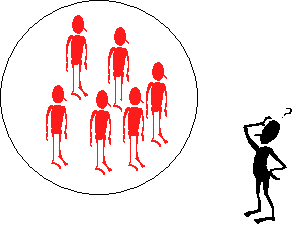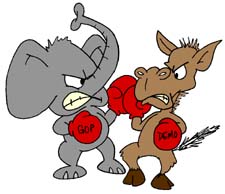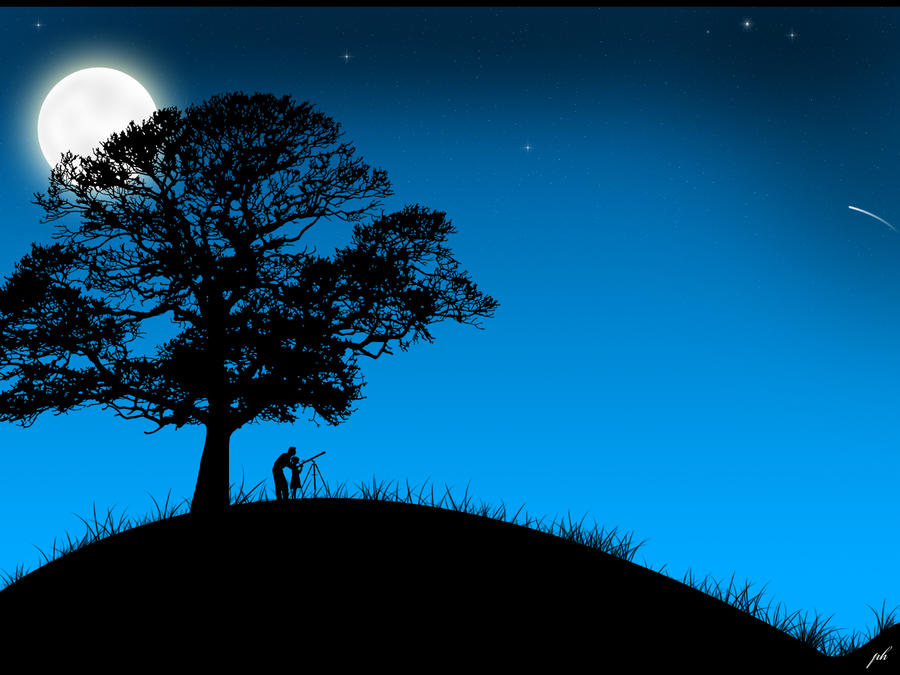Today the Supreme Court of the United States struck down the Defense of Marriage Act. While the Court struck down the law based upon the 5th Amendment, and not the 14th, the ruling still has some important implications. There is a definite feeling that the Court majority wanted to go further, but felt that doing so would create the same kind of cultural and political divisions that Roe v. Wade did in 1973.
The Court learned a valuable lesson from the ruling on abortion. It was a kind of ruling that was different from the rulings regarding race and civil rights, and it hinged upon a single, important concept: choice.
To Choose or Not To Choose
In the United States, protected classes are defined in both the Constitution and in Court precedent. Legally, outside of these classes, there are no "types" or "groups" of people which are afforded the protection of the 14th Amendment. Officially, anyway.
Unofficially, and in the consciousness of the population, what really divides "rights" and "privileges" is choice.
You cannot choose to be white or black, you cannot choose to be male or female, you cannot choose to be young or old. You have no element of choice or opinion on these things. The philosophical basis for protected classes in the United States is centered around the idea that you should not be discriminated against for things over which you have no choice or control.
Even things like poverty, which you may be born into, you still have some element of choice over, and while the Court understands that not everyone will escape that kind of restriction, some can and there are choices you can make which improve your chances of doing so. At its core, you can still work hard to improve your lot in life here in the United States. It might not be a sure thing, but it can and does happen.
 |
| Abortion is still a very controversial issue in the US. |
This is part of what has made the Roe v. Wade decision so controversial for so long. It created a right to something which a large portion of the country did not view as something that happens to you, but instead around a circumstance that you put yourself in. Others viewed the choice not in the conception (and certainly in cases of rape, for instance, there is no choice in the matter) but in the termination.
These are fundamentally different conceptions of the human condition itself, and you don't win people over one way or the other by shouting about "life" or "choice". You don't win that argument by demonizing the other side.
When the Court first ruled on Roe v. Wade, it believed it was making another ruling in the vein of its many civil rights rulings, but what the country discovered afterward is that while racists did concede that blacks could not choose their skin color, the aspect of choice surrounding abortion was unsettled and quite volatile, leaving the question of abortion open instead of settled. After all, a different court might rule a different way, since in the view of the opposition, the ruling itself was arbitrary.
The Court wanted to avoid that same debacle with gay marriage and gay rights, and that is why they didn't rule in a way that made gay marriage legal across the entire country.
The Steady March of Progress
Many people in society today believe that gay rights and gay marriage, and even sexuality as a protected class, are only a matter of time. Several months ago, the National College Republicans released a report where they outlined results from focus groups, noting that among young people of all political leanings, gay marriage and gay rights are seen as obvious and fundamental.
 |
| Many Christians have begun to recognize how human the hate for gays is. |
Many religious groups are also transitioning away from direct combativeness with gays and gay rights, and beginning to once again approach sin as simply sin, something all of us share.
This long view of society is probably something that is shared by much of the Court, however despite the feeling of inevitable change within our society, a significant portion of people view homosexuality as a choice.
This comes back to what the Court learned from the 70's. If they pushed it too fast, while the issue of fundamental humanity was still unresolved, they would cause all meaningful debate to halt, and cause each side to become entrenched and blind forcing the country into meaningless conflict with itself.
Onward and Upward
The Court took such a measured approach to this topic because it understands the turmoil it can accidentally send the country into by being hasty. Real change never comes from the dictates of the government, it always comes from the people.
I used to believe that homosexuality was a choice. I no longer do. This is a transformation of thought that will continue throughout our society I believe. I did not change my views on a whim, it happened because I became friends with people of many different sexual orientations, and I began to be able to see things from their perspective.
 |
| Their love and dignity are worth more than my pride or belief |
From their perspective, my view was ugly and hurtful, and it caused me to think, and ultimately to accept that I had been wrong. These people were people, and they deserved the same dignity that all other people did, and I began to see how my opinions hurt them. I also came to understand how their opinions did not hurt me.
While gay rights are not as much of an issue in other parts of the world, or in some even more of an issue, the fundamental forces at play are absolutely critical to our global society. The world itself is learning how to shed unjust discrimination, and that type of social learning takes time. Time that is unfair to those who are being wronged, but time which must be taken if we are to create lasting change in the hearts and minds of people everywhere.
Fear is a powerful emotion that still sends us into fits of tribalism and absurdity, and I personally am very pleased that the Supreme Court has learned the lesson of Roe v. Wade to such an extent. Any time injustice is being done, it is incumbent upon the people not the government to address it. The power of the government to right such wrongs only exists when the will of the people is there to enforce such a change throughout society, and we must all learn to be more empathetic with each other if we want to continue onward and upward.
UPDATE: To be clear, because upon rereading this post I realized it wasn't, I do not support gay marriage in spite of my belief that it is wrong, however I believe that is an acceptable position to hold. Rather, I support gay marriage because I believe that it is morally correct to do so, and that there is nothing immoral about a society allowing it, and that there is nothing immoral about gay people in general.
Believing, even personally, that being gay is wrong even when I believe it is not a choice would make me a bigot by definition, and it is a position I would never take. There is nothing wrong with being gay, there is nothing immoral about being gay, and there is nothing about being gay which is harmful to the rest of society. That is what I believe.
UPDATE: To be clear, because upon rereading this post I realized it wasn't, I do not support gay marriage in spite of my belief that it is wrong, however I believe that is an acceptable position to hold. Rather, I support gay marriage because I believe that it is morally correct to do so, and that there is nothing immoral about a society allowing it, and that there is nothing immoral about gay people in general.
Believing, even personally, that being gay is wrong even when I believe it is not a choice would make me a bigot by definition, and it is a position I would never take. There is nothing wrong with being gay, there is nothing immoral about being gay, and there is nothing about being gay which is harmful to the rest of society. That is what I believe.






